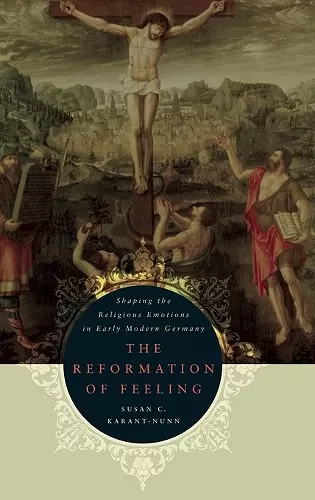Reformation of Feeling
Shaping the Religious Emotions in Early Modern Germany
Format:Hardback
Publisher:Oxford University Press Inc
Published:27th May '10
Currently unavailable, and unfortunately no date known when it will be back

Susan Karant-Nunn argues that the 16th-century Reformation movement sought not only to modify people's doctrinal convictions and their behavior but to root these changes in altered sentiment. She finds evidence for this thesis in all of the media employed by ecclesiastical authorities within Catholicism, Lutheranism, and the Reformed churches - including sermons, catechetical materials, liturgical modifications, the decoration of sanctuaries, and hymns and their lyrics. She focuses especially on the content of preaching on the Passion during Holy Week as well as treatments of the good Christian death. She finds that in late medieval through 17th-century Catholicism, hearers were enjoined to cultivate a profound identification with Jesus in his agony, as he makes his way from the Garden of Gethsemane to the Cross. Indeed, the pious ought to feel his suffering in their own bodies. She traces the emergence of Lutheran restraint and emphasis on the accomplished atonement of Christ for human sin. Sorrow must be present, but quickly gives way to the consolation of God's love. The Reformed preachers (Zwinglian and Calvinist), however, while agreeing that Christ's suffering benefited all of the elect, enjoined self-condemnation on all their hearers - the recognition that no one deserved God's gratuitous gift of eternal life. She looks at the awareness of preachers from all three groups of the emotional difference that set them apart from the others. Clergymen's training in rhetoric, she shows, attuned them to the goal of undergirding intellectual persuasion with feeling.
Karant-Nunn is one of the first to take up the challenge of the 'history of emotions' and delineate the emotional cultures of Catholicism and Protestantism which have left such deep traces in our cultures right up to the present day. She shows the insidious anti-Semitism that went along with Passion sermons: the more preachers stressed Christ's suffering, the more they incited hatred of the 'Jesus killers.' By taking the feelings of anger, hatred and envy seriously, she is able to avoid the sentimentality which can come from stressing only the virtues of love and charity, and so provides the most convincing account of emotions in history that I have read. * Lyndal Roper, Fellow and Tutor in History, Balliol College Oxford *
Reformation history meets the new history of emotions in this pioneering study. Susan Karant-Nunn not only sheds new light on a host of debates among scholars of the European reformations but she further illuminates a crucial stage in the evolution of emotional regimes in the history of the West. * Ulrike Strasser, Associate Professor of History, University of California, Irvine *
After having devoured this engrossing and magisterial study, one truly must wonder why Susan Karant-Nunn is the first to take up the topic of the emotional cultures that emerged from the various Reform movements. Meticulously researched and superbly synthesized, The Reformation of Feeling is a landmark study in Reformation Studies-a stepping stone to a cultural history of the Reformation. * Helmut Puff, Associate Professor of History, University of Michigan *
A valiant, even daring, expedition into the spiritual world underneath the theological debates, colloquies, political schemes, wars, and treaties that in the past have filled the pages of most histories of the German reformation. * The Catholic Historical Review *
Karant-Nunn offers an immensely valuable model of how to reflect on spectrums of attitude within each faith and change as much as continuities over time. * Ulinka Rublack, St. John's College, Cambridge University *
ISBN: 9780195399738
Dimensions: 155mm x 236mm x 31mm
Weight: 632g
352 pages